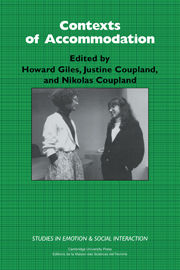Book contents
- Frontmatter
- Contents
- List of contributors
- 1 Accommodation theory: Communication, context, and consequence
- 2 Audience accommodation in the mass media
- 3 Accommodation on trial: Processes of communicative accommodation in courtroom interaction
- 4 Accommodation in medical consultations
- 5 Accommodation and mental disability
- 6 Accommodation in therapy
- 7 Accommodation in native-nonnative interactions: Going beyond the “what” to the “why” in second-language research
- 8 Interethnic accommodation: The role of norms
- 9 Organizational communication and accommodation: Toward some conceptual and empirical links
- Index
1 - Accommodation theory: Communication, context, and consequence
Published online by Cambridge University Press: 18 March 2010
- Frontmatter
- Contents
- List of contributors
- 1 Accommodation theory: Communication, context, and consequence
- 2 Audience accommodation in the mass media
- 3 Accommodation on trial: Processes of communicative accommodation in courtroom interaction
- 4 Accommodation in medical consultations
- 5 Accommodation and mental disability
- 6 Accommodation in therapy
- 7 Accommodation in native-nonnative interactions: Going beyond the “what” to the “why” in second-language research
- 8 Interethnic accommodation: The role of norms
- 9 Organizational communication and accommodation: Toward some conceptual and empirical links
- Index
Summary
Introduction
When academic theorizing addresses everyday communication phenomena, there are losses as well as gains. Research may, selectively or otherwise, partially represent the full subtlety of contextualized interaction. Methodological constraints may impose their own selectivity, so that we tend to access the accessible and learn what is most readily learnable. The real-time nature of programmatic research will reflect epistemological shifts and disciplinary development. It is altogether likely that academic and lay versions of the phenomena themselves and their boundaries will not perfectly mirror each other at any one point.
On the other hand, research can discover regularities within communicative interchanges and identify, and perhaps even predict, contextual configurations that relate systematically to them. If it is amenable to methodological triangulation upon data and research questions, and if it incorporates within its own activities a mechanism for building cumulatively on empirical insights, communication research can begin to impose order on the uncertainty that interaction presents to us. More particularly, research that addresses the contexts as much as the behaviors of talk can tease out the ordering – motivational, strategic, behavioral, attributional, and evaluative – that interactants themselves impose upon their own communication experiences, and the ways in which the social practices of talk both are constrained by and themselves constrain goals, identities, and social structures.
In the case of “accommodation theory,” the focus of the present collection, we have a research program that has developed over more than a dozen years, undergoing many extensions and elaborations, as an account of contextual processes impinging on sociolinguistic code, style, and strategy selections.
- Type
- Chapter
- Information
- Contexts of AccommodationDevelopments in Applied Sociolinguistics, pp. 1 - 68Publisher: Cambridge University PressPrint publication year: 1991
- 441
- Cited by



